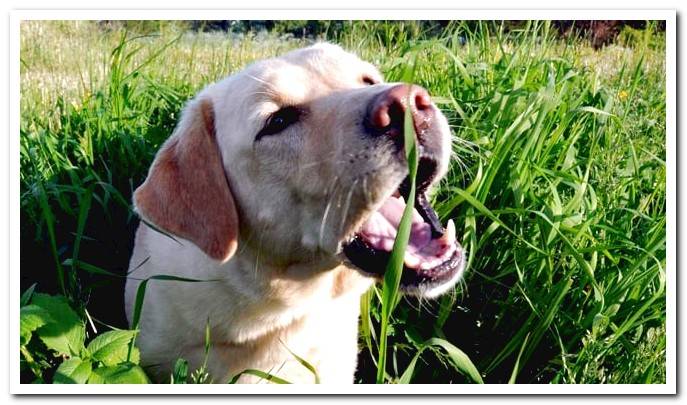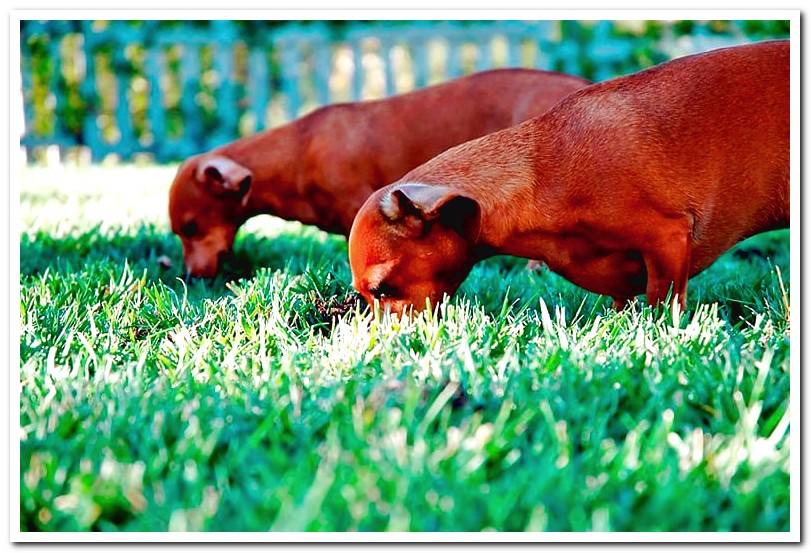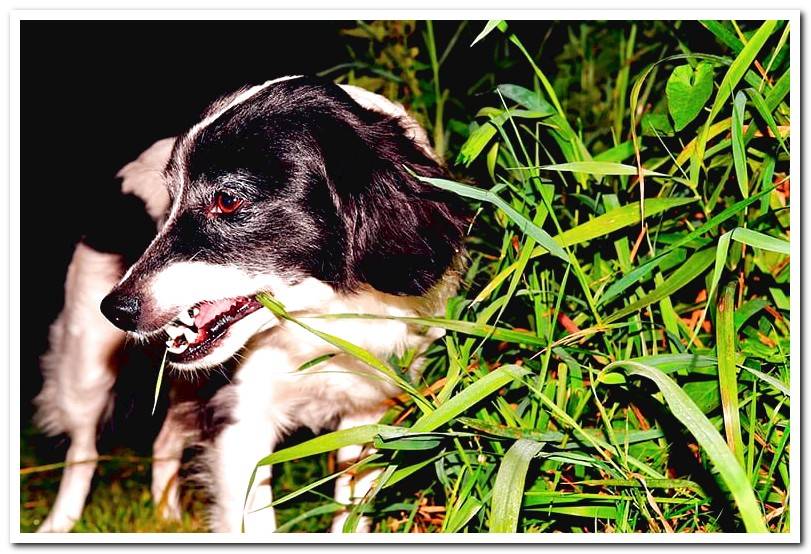
Surely on more than one occasion you have seen your dog or someone you know eat grass in the park, and you may have wondered if it is good to let them eat or we should avoid doing so.
Eating grass is a fairly common behavior in dogs and there are many owners who, concerned about the subject, consult the vet. Next, we will try to understand why our dog eats grass and whether we should allow this behavior.
- You may also like: Why does my dog eat dirt?
Index of contents
- 1 Why do some dogs eat grass?
- 1.1 Eating grass to purge
- 1.2 Eating grass to meet your nutritional needs
- 1.3 Dogs eat grass because they are hungry
- 1.4 Eating grass as part of their natural behavior
- 2 Should we let our dog eat grass?
- 2.1 Eating this type of herb can have a number of health risks:
Why do some dogs eat grass?
Some studies claim that 68% of dogs eat grass regularly. As you can see it is a fairly high percentage; however, little research has been done to determine the causes of this behavior.
There are several theories that try to justify this behavior, so we are going to review them one by one to get to understand this behavior.
Eating grass to purge
The most popularly explained explanation is that dogs eat grass to purge themselves. That is, dogs would eat grass with the aim of vomiting and thus relieve their stomach discomfort or possible parasites.
But, What does science say about this hypothesis? A study by the University of California investigated this question and the results obtained were as follows:
- 68% of the dogs studied ate plants or grass regularly.
- Only 9% of dogs had symptoms of illness before eating grass.
- In only 22% of cases, vomiting occurred after eating grass.
If we evaluate these results, we observed that the percentage of dogs that presented discomfort before consuming grass was very low, and furthermore, they did not always manage to vomit after ingesting it.
Therefore, according to this study, grass intake does not have to be associated with gastric discomfort, and eating plants or grass could simply be a natural behavior of the dog.
Under my personal experience as a professional veterinaryn, I share the conclusions of this study, since I have been able to verify that my dogs eat fresh grass whenever they have the opportunity, and in no case have I associated that they do so because their stomach hurts.
In addition, I keep his deworms up to date, so his behavior is not related to problems with intestinal parasites.
Eating grass to meet your nutritional needs
There are some experts who claim that dogs eat grass to meet their nutritional needs.
In the case of wolves this theory is true, since a diet based exclusively on meat would be deficient; therefore, they ingest the stomach contents of their prey (which has partially digested vegetables) and eat fruits as part of their regular diet.
However, the nutritional needs of the domestic dog are assured with high-end feed that already contains adequate levels of vegetables.
Studies show that dogs that receive a balanced diet also consume grass. So we can confirm that the consumption of grass is not associated with nutritional deficiencies.

Dogs eat grass because they are hungry
There are recent studies showing that this behavior is directly related to satiety, that is, dogs eat more grass when they are hungry than when they are satiated.
Therefore, this theory could explain a “grass pecking” behavior in those animals that have food anxiety and do not feel easily satiated.
Eating grass as part of their natural behavior
Eating grass is common behavior in wild wolves and is justified. Wild canids eat grass and other vegetables to promote the elimination of parasites and as part of their diet to avoid nutritional deficiencies.
Dogs are descended from wolves, and many of our pets’ behaviors are an innate heritage of their wild ancestors.
Dogs seem to be attracted to the taste of the herb and like the habit of chewing it. In fact, it has been found that dogs that have direct access to grass tend to spend a minimum of three minutes a day consuming it.
Therefore, we can conclude that currently the most correct theory would be that dogs eat grass naturally and because they like it, this being normal and inherited behavior.

Should we let our dog eat grass?
Now that you know that this is a natural behavior and that it can be pleasant for our dog, you are probably wondering if it is good for a dog to eat grass on a regular basis or if it can cause health problems.
From an ethological or behavioral point of view, dWe should let dogs eat grass if they want to and not suppress this behavior.. However, from a health perspective, we should not let them eat grass from the street or from the fields.
Eating this type of herb can have a number of health risks:
- The grass in the parks is usually treated with pesticides, so if our dog ingests it, it can be poisoned.
- The plants of the field, although we think that they are natural and safe, can be a vehicle for parasites in the form of larvae or eggs and cause infestations in our pets if they eat them.
If you want your dog to enjoy eating grass safely, you can consider the option of placing a pot at home and planting grass or another type of edible grass in it.
But we must not forget that there are dogs with digestive sensitivity and they may not tolerate eating grass well; so in the event that vomiting or diarrhea appear, its ingestion is contraindicated.
